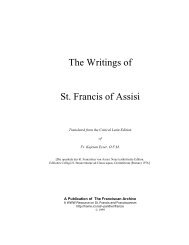the history of heresies, and their refutation - Catholic Apologetics ...
the history of heresies, and their refutation - Catholic Apologetics ...
the history of heresies, and their refutation - Catholic Apologetics ...
Create successful ePaper yourself
Turn your PDF publications into a flip-book with our unique Google optimized e-Paper software.
<strong>the</strong> infamous Thalia, were likewise condemned by <strong>the</strong> Emperor <strong>and</strong> <strong>the</strong> council, <strong>and</strong> <strong>the</strong> Emperor<br />
published a circular or decree through <strong>the</strong> entire empire, ordering <strong>the</strong> writings <strong>of</strong> Arius to be everywhere<br />
burned, <strong>and</strong> denouncing <strong>the</strong> punishment <strong>of</strong> death against any one who would controvert this order (39).<br />
<br />
19. The council having disposed <strong>of</strong> Arius, next suspended Meletius, Bishop <strong>of</strong> Lycopolis, from all his<br />
episcopal functions, <strong>and</strong> especially from ordaining any one; but ordered, at <strong>the</strong> same time, that all his<br />
followers should be admitted to <strong>the</strong> communion <strong>of</strong> <strong>the</strong> Church on condition <strong>of</strong> renouncing his schism <strong>and</strong><br />
doctrine (40).<br />
<br />
20. The council likewise arranged <strong>the</strong> question <strong>of</strong> <strong>the</strong> celebration <strong>of</strong> Easter, which <strong>the</strong>n made a great noise<br />
in Asia, by ordering that in future it should be celebrated not in <strong>the</strong> Jewish style, on <strong>the</strong> fourteenth day <strong>of</strong><br />
<strong>the</strong> moon but according to <strong>the</strong> Roman style, on <strong>the</strong> Sunday after <strong>the</strong> fourteenth day <strong>of</strong> <strong>the</strong> moon, which<br />
falls after <strong>the</strong> vernal equinox.<br />
(37) St. Hieron. Epist. ad Ctesiphont.<br />
(38) Juenin, Theol. t. 3, ar, 4, sec. 1.<br />
(39) Fleury, t. 2, l. 11, n. 24; Orsi, t. 5, l. 12, n. 42.<br />
(40) N. Alex. ar. 4, sec. 2,<br />
<br />
This <strong>the</strong> council declared was not a matter <strong>of</strong> faith, but discipline (41); for whenever it speaks <strong>of</strong> articles <strong>of</strong><br />
faith as opposed to <strong>the</strong> errors <strong>of</strong> Arius, <strong>the</strong> words, " This <strong>the</strong> church believes," are used, but in making this<br />
order, <strong>the</strong> words are, " We have decreed, &c." This decree met with no opposition, but as we learn from<br />
<strong>the</strong> circular <strong>of</strong> Constantine, was embraced by all <strong>the</strong> Churches (42), <strong>and</strong> it is thought that <strong>the</strong> council <strong>the</strong>n<br />
adopted <strong>the</strong> cycle <strong>of</strong> nineteen years invented by Meto, an A<strong>the</strong>nian astronomer, for fixing <strong>the</strong> lunations <strong>of</strong><br />
each year, as every nineteenth year <strong>the</strong> new moon falls on <strong>the</strong> same day <strong>of</strong> <strong>the</strong> solar year as it did<br />
nineteen years before (43).<br />
<br />
21. The council next decreed twenty canons <strong>of</strong> discipline; we shall mention some <strong>of</strong> <strong>the</strong> principal ones.<br />
1st. The council excludes from <strong>the</strong> clergy, <strong>and</strong> deposes, all those who have voluntarily made <strong>the</strong>mselves<br />
eunuchs, in opposition to <strong>the</strong> heresy <strong>of</strong> <strong>the</strong> Valerians, who were all eunuchs; but more especially to<br />
condemn those who justified <strong>and</strong> followed <strong>the</strong> example <strong>of</strong> Origen, through love <strong>of</strong> chastity (44). By <strong>the</strong><br />
third canon, <strong>the</strong> clergy are prohibited from keeping in <strong>the</strong>ir houses any woman unless a mo<strong>the</strong>r, a sister,<br />
an aunt, or some person from whom no suspicion can arise. It was <strong>the</strong> wish <strong>of</strong> <strong>the</strong> council to establish <strong>the</strong><br />
celibacy <strong>of</strong> bishops, priests, <strong>and</strong> deacons, <strong>and</strong> sub-deacons even, according to Sozymen, but <strong>the</strong>y were<br />
turned from this by St. Paphnutius, who forcibly contended that it was quite enough to decree that those<br />
already in holy orders should not be allowed to marry, but that it would be laying too heavy an<br />
obligation on those who were married before <strong>the</strong>y were admitted to ordination, to oblige <strong>the</strong>m to<br />
separate <strong>the</strong>mselves from <strong>the</strong>ir wives. Cardinal Orsi, however, says (45), that <strong>the</strong> authority <strong>of</strong> Socrates is<br />
not sufficient to establish this fact, since both St. Epiphanius, who lived in <strong>the</strong> time <strong>of</strong> <strong>the</strong> council, <strong>and</strong> St.<br />
Jerome (46), who was born a few years after, attest that no one was admitted to orders unless unmarried,<br />
or if married, who separated himself from his wife. It was ordained in <strong>the</strong> fourth canon that bishops<br />
should be ordained by all <strong>the</strong> co-provincial bishops, or at least by three with consent <strong>of</strong> <strong>the</strong> rest, <strong>and</strong> that<br />
<strong>the</strong> right <strong>of</strong> confirmation appertaining to <strong>the</strong> Metropolitan, should be strictly preserved.<br />
(41) St. Athan. de Synod, n. 5; Nat, Alex. ar 4 sec; 2 (42) Euseb. His. l. 3, c. 18, & Socrat. (44) Ibid.; N. Alex.<br />
ibid. (45 ) Orsi ibid; Soc. l. 1. (46) Epiphan. Her. 59, & St. Hier. adv. Vigilan.<br />
<br />
The sixth canon says that <strong>the</strong> rights <strong>of</strong> <strong>the</strong> Patriarchal Sees shall be preserved, especially those <strong>of</strong> <strong>the</strong> See<br />
<strong>of</strong> Alex<strong>and</strong>ria, over <strong>the</strong> Churches <strong>of</strong> Egypt, <strong>of</strong> Lybia, <strong>and</strong> <strong>of</strong> Pantopolis, after <strong>the</strong> example <strong>of</strong> <strong>the</strong> Bishop <strong>of</strong><br />
Rome, who enjoys a similar authority over <strong>the</strong> Churches subject to his Patriarchate. Noel Alex<strong>and</strong>er (47)<br />
has written a special dissertation to prove that <strong>the</strong> primacy <strong>of</strong> <strong>the</strong> Roman See is not weakened by this<br />
canon, <strong>and</strong> among o<strong>the</strong>r pro<strong>of</strong>s adduces <strong>the</strong> sixth canon <strong>of</strong> <strong>the</strong> great council <strong>of</strong> Chalcedon; " <strong>the</strong> Roman<br />
Church always had <strong>the</strong> primacy," <strong>and</strong> it is proved, he says, that after this canon was passed, <strong>the</strong> Bishop <strong>of</strong><br />
Rome judged <strong>the</strong> persons <strong>of</strong> <strong>the</strong> o<strong>the</strong>r patriarchs, <strong>and</strong> took cognizance <strong>of</strong> <strong>the</strong> sentences passed by <strong>the</strong>m,<br />
<strong>and</strong> no one ever complained that he usurped an authority which did not belong to him, or violated <strong>the</strong><br />
sixth canon <strong>of</strong> <strong>the</strong> council <strong>of</strong> Nice.<br />
<br />
22. Finally, <strong>the</strong> fa<strong>the</strong>rs wrote a circular letter addressed to all churches, giving <strong>the</strong>m notice <strong>of</strong> <strong>the</strong><br />
condemnation <strong>of</strong> Arius, <strong>and</strong> <strong>the</strong> regulation concerning <strong>the</strong> celebration <strong>of</strong> Easter. The council was <strong>the</strong>n<br />
Page 28 <strong>of</strong> 352













